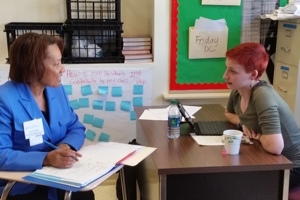Education
Viewpoints: The Role of the University Supervisor in Teacher Education

The role of the university supervisor in teacher education is threefold:
- providing instructional and classroom management support;
- establishing meaningful relationships based upon trust and honesty; and
- providing strategies for effective self-reflections to further professional growth.
The complexities of teaching require pre-service teachers to firmly assess their own attributes, attitudes, and competencies to ensure academic success in the teaching and learning process. To this end, the university supervisor serves in several capacities (consultant, facilitator, mentor) while providing support in both a clinical and practical approach.
University supervisors are charged with providing instructional support to pre-service teachers. These areas include diagnosing instructional needs and curriculum decisions in conjunction with student abilities and interest. Providing concrete examples of classroom management techniques has been one of the keystone areas of clinical support. Delivery of the lesson that encourages student engagement and understanding the main concepts of student mastery and assessments are critical in determining effective teaching. Pre-service teachers must decide what is to be taught and why; how to implement the lesson based upon student diversities and abilities; and how to evaluate success in a data driven environment. The university supervisor strategically navigates them through this process.
The relationship between the university supervisor and the pre-service teacher must be built upon trust and honesty. Communication is important when working in a close, helping relationship. A sincere commitment to the teaching profession accompanied by a level of competency and professionalism is vital in establishing open lines of communication. This 'sharing moment' requires the university supervisor to address not only the instructional aspects of teaching but also take into consideration the personality and past experiences of the teacher.
One of the most important factors in the pre-service stage is the ability to develop effective reflective practices. Hope Hartman (2001) refers to reflective practices as teacher metacognition. This includes reflecting on instructional goals, students' characteristics and needs, content level and sequence, teaching strategies, materials and other issues (Hartman, 2001, p 149). The linkages between interpersonal skills and technical skills must be examined in the confines of the teaching and learning experience. What does this mean to the practicum student/student teacher? How can the university supervisor effectively direct this process?
During the feedback conference the university supervisors should concentrate on constructive analyses and reinforcement of successful patterns based upon observational evidence (Hopkins &Moore, 1992). More specifically, this is the opportunity to reflect objectively on the teaching experience and to apply concepts for self-assessments building upon the identified strengths and recognizing the areas for improvement. This process can begin with the expectations of the lesson (effective planning); the level of implementation (student engagement;teaching methods; materials/resources); and the overall outcome (student mastery). Reflection is a continuous process.
The pre-service stage is an educational journey to discover one's personal aptitude, attitude, and preferences that can impact one's ability to teach. The university supervisor provides the mentoring, support, and the 'helping hand' to analyze the teaching experience. Recognizing best practices through self-reflection is important to professional growth. However, this two-way interaction to discuss effective teaching practices relies heavily on the existence of a positive relationship based upon respect, cooperation, trust, and professionalism.
Sources:
Hartman, Hope (2001). "Teaching Metacognitively" in Metacognition in Learning and Instruction: Theory, Research, and Practice, Neuropsychology and Cognition, Vol. 19,pp 149-172
Hopkins, W. Scott, and Moore, Kenneth (1992). Clinical Supervision: A Practical Guide to School Supervision. Madison, WI: Brown &Benchmark, pp 75-96
